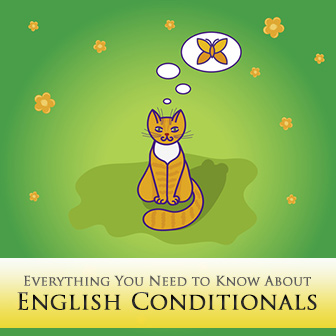When your ESL class starts discussing a limitless future full of potential and why what could have been wasn’t, you and your students are entering the world of English conditionals.
Conditionals are a sentence structure in English used to talk about events in the past, present or future that may or may not have happened. These events depend on another event or condition, which is expressed in an if-clause in the sentence. In English, there are 4 basic types of conditionals you and your students will need to understand.

Here's Everything Your Students Need to Know About English Conditionals
First the Basic Structure
No matter which type of conditional you are using, the basic sentence construction will be the same. Conditionals are expressed in a complex sentence, that is a sentence with one a independent clause and one dependent clause. Conditionals use the dependent clause to express the condition required for the second event. This condition is expressed in an if-clause. If the weather is good…If he gets the job…If we had been at the concert… The main clause in the complex sentence expresses the result of that condition. …we will go on a picnic…he will pay you back…we would have seen the movie star. The order of these two clauses does not matter, sometimes the if-clause is at the beginning, sometimes at the end of the sentence, but a conditional sentence in English must have both parts.
-
1
Zero Conditional
Zero conditionals are also called real conditionals. They express something that is certain or real, a result that always happens providing the condition in the if-clause is met. These results may be general facts, universal truths, or personal results in a given situation. For example,
- General Fact: If water reaches 212 degrees Fahrenheit, it boils.
- Universal Truth: If you cut a man, he bleeds.
- Personal Truth: If I eat chocolate, I break out.
To form a zero conditional, the verb in the if-clause should appear in the present tense. The verb in the result clause should also appear in the present tense.
-
2
First Conditional
First conditionals are results that are likely to occur; they will probably happen though the outcome is not certain. With first conditionals, there is a possibility that they will not turn out as one would expect, but that possibility is slight. When forming first conditionals in English, the if-clause appears in the present tense, and the result clause appears in the simple future. For example,
- If she studies, she will get good grades.
First conditionals are not always simple, however. In more complex sentences, you can use other modals in the result clause depending on the outcome’s level of certainty.
- If she studies, she might get good grades.
- If she studies, she could get good grades.
The if-clause, as well, is not limited to the present tense in first conditionals. The verb can also appear in the present progressive, present perfect, and simple future.
- If she is still studying (right now), she will not get any sleep.
- If she has gone (now), I will tell you.
- If she will give me the money, I will (agree to) give her the product.
-
3
Second Conditional
Second conditionals, also called unreal conditionals, express a situation that is not real or is not likely to happen. The if-clauses expresses the condition that would need to be met, and the result clause expresses what would happen if it were met. However, the speaker who uses a second conditional does not think that these events will occur. For second conditionals about a current situation, the if-clause is not true.
- If I had the money (right now), I would buy a new car. (I do not have the money.)
When talking about future events, a second conditional if-clause expresses a condition that is not likely to happen.
- If she won the lottery (in the future), she would buy me a car. (She probably won’t win the lottery.)
In both sentences, the if-clause is expressed in the simple past, and the result clause is expressed with “would” plus the base verb. Other modals can also be used in the result clause.
- If she won the lottery, she might buy me a car.
- If she won the lottery, she could buy me a car.
In formal language situations, the verb “be” is conjugated as “were” rather than “was” in the if-clause when the subject is I, you, she/she/it. For informal speech, was is an acceptable alternative.
- If I were going to buy a car, I would get insurance.
-
4
Third Conditional
Third conditionals are also unreal conditionals, but they express an unreal situation in the past. The condition occurred in the past, and it was not met; therefore the results did not happen. The conditional sentence expresses the idea of “what if”.
- If she had called me, I would have come. (She didn’t call, so I didn’t come.)
To form an unreal past conditional, the if-clause verb appears in the past perfect, and the result clause uses “would have” plus the past participle of the main verb.
Conditionals can be very complicated no matter what language you are studying.
But if your students can get a grasp on these four basic conditional structures, they will have the foundation they need to imagine limitless possibilities.
P.S. If you enjoyed this article, please help spread it by clicking one of those sharing buttons below. And if you are interested in more, you should follow our Facebook page where we share more about creative, non-boring ways to teach English.







